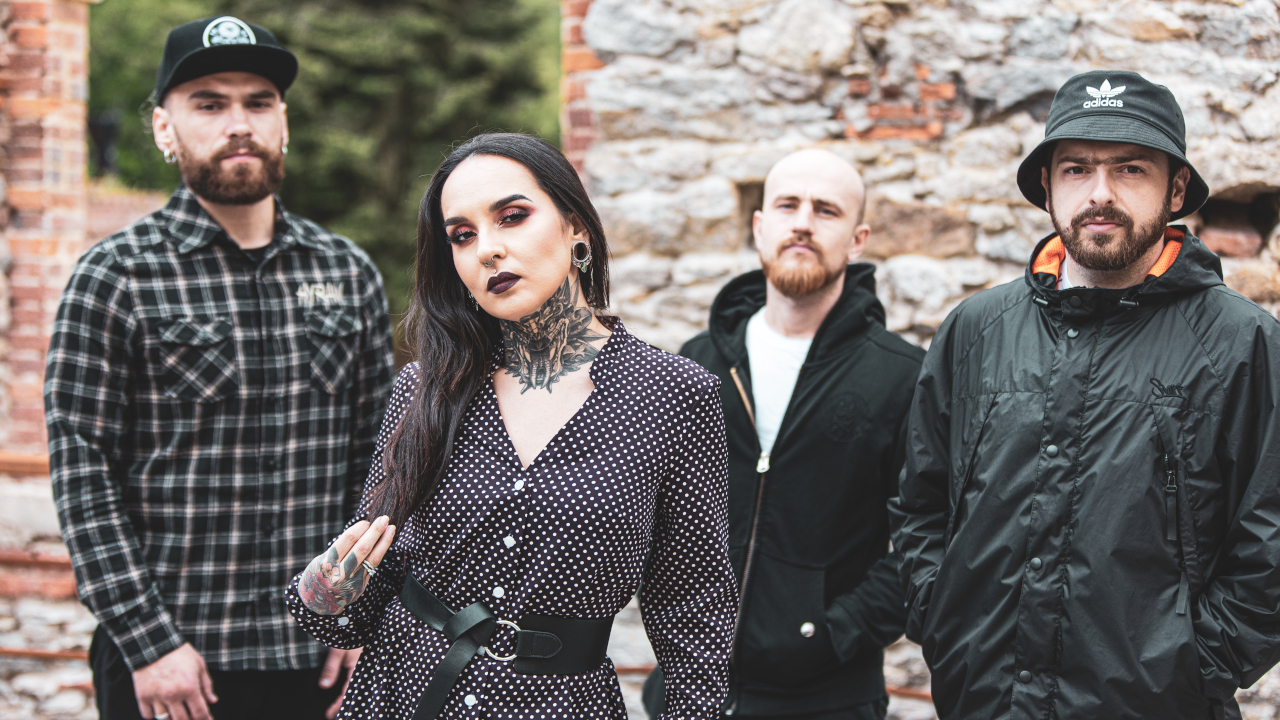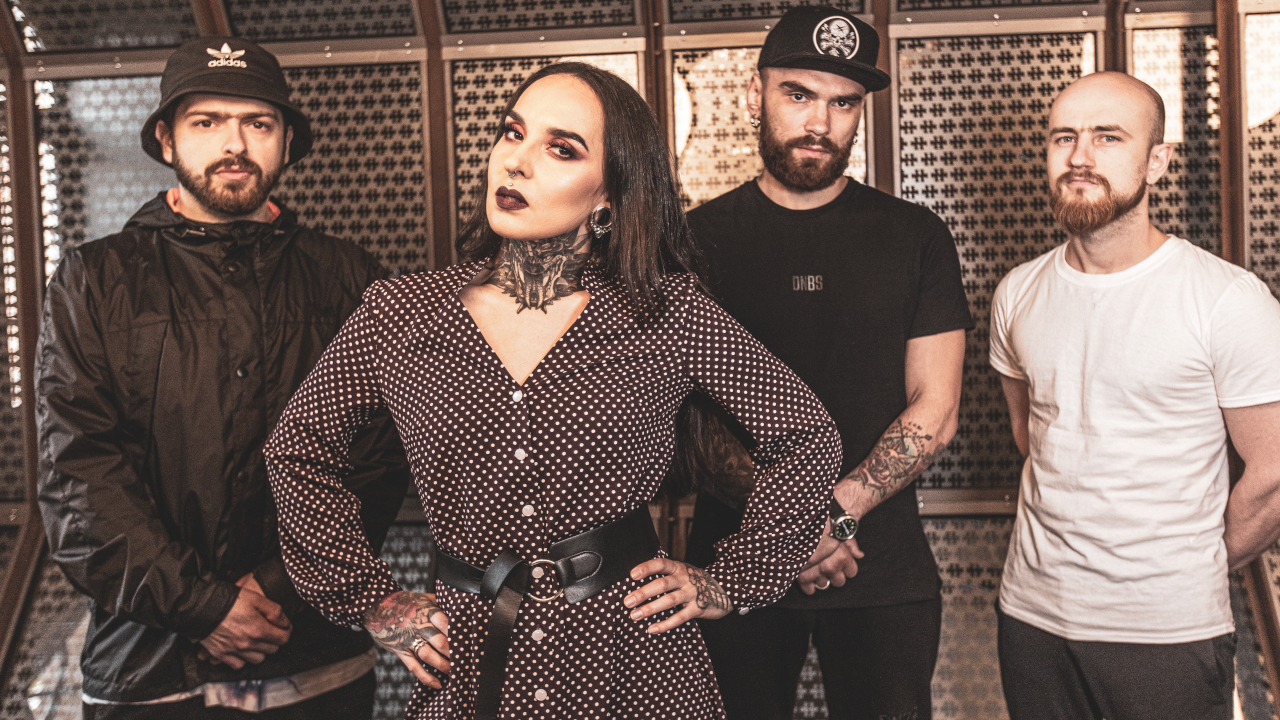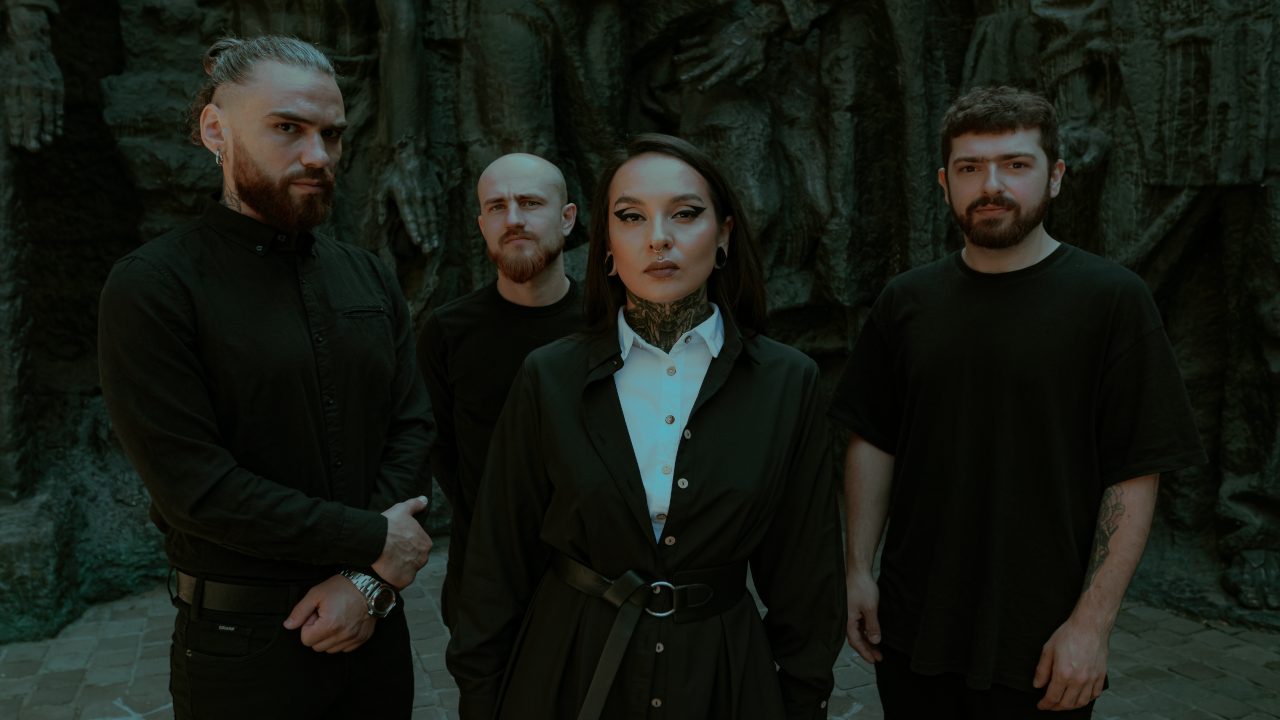At least once a day, when I’m home in my apartment, I catch myself thinking, ‘I wish I could go home.’ But I have no idea what that actually means.”
For Jinjer frontwoman Tatiana Shmayluk, home is a nebulous concept. Having spent the better part of a decade on the road, her Kiev apartment – the setting for today’s Zoom chat – has been little more than a glorified storage space. Case in point: when COVID hit, rather than rushing back, she decided to stay in the US, waiting with terminal optimism for everything to blow over so they could continue their tour of the Americas.
But then, neither Tatiana nor her bandmates are actually from Kiev. Growing up, ‘home’ was Gorlovka, a small city in Ukraine’s Donetsk Oblast region. But in 2014 they were forced to leave their childhood homes and families behind, when war broke out between Ukrainian armed forces and Russian-backed separatists. For the next 18 months, home was a run-down apartment near the Polish border, often living without basic amenities such as heating, electricity or water, and facing discrimination from locals due to their origins in the Eastern part of Ukraine.
Little wonder, then, that this was when the band began to play shows internationally, opting to fill their calendars rather than bemoan their lot. It paid off – when Hammer last met with Jinjer, in Germany in October 2019, they were riding high on a summer of sold-out shows and packed festival performances, the enormous crowds at Wacken and Download testament to the band’s breakout appeal. Poised to release their third record, Macro, Jinjer envisioned a chance to replicate their European success on an intercontinental scale, and booked headline dates in the US, Australia and South America.
In a case of pathetic fallacy, the weather was uncharacteristically gloomy as Jinjer prepared to take the stage at Mexico’s Hell & Heaven Metal Fest on March 15, 2020. The band already knew it would be their last show of the tour – all other immediate dates were pulled as COVID-19 began ravaging the planet. “We had hopes that it would all blow over in a few months or so, but soon all hope was gone,” admits bassist Eugene Abdukhanov.
“It felt like a lot of people were just in shock, like they knew nothing would happen for a while,” Tatiana adds. “It was a really depressing way to end the tour, but the show itself was great.”
While Tatiana waited things out in California, Eugene and the rest of the band headed home to their families in Ukraine. “At that point, I was almost happy to stop and be in the same place for longer than a couple of days!” he admits. “But after three or four months I was getting tour-sick – I craved that feeling of playing live onstage, of seeing my bandmates every day.”

Having spent years cooped up together in buses, studios and backstage areas, it’s unsurprising that separation anxiety set in. But it also gave Jinjer a chance to regroup and reflect, recognising that across three records and innumerable shows they had developed into a genuine metal sensation, capable of selling out venues internationally and pulling enormous numbers on streaming platforms. A big part of that success is due to the charismatic Tatiana, her voice ranging from soaring 90s alt-metal cleans to death metal growls and snarls. It’s exactly the kind of thing Youtube reaction videos are made for, Tatiana inspiring a host of wide-eyed ‘Wait, WHAT?’ moments.
“[Before lockdown], we couldn’t really see what we had achieved, because we were always running from one place to another,” Eugene says. “After we stopped we could look back and see all this road we’d covered.”
“It’s crazy how much we needed that,” agrees Tatiana. “It gave us a kind of time and perspective that no money could buy.”
Unfortunately, this personal development came at the cost of their ambitions for Macro. A steady stream of music videos and a live DVD release (last November’s Alive In Melbourne) kept the band’s profile up while touring was on pause, and they even managed to undertake a short international tour in September 2020, playing shows in Germany and Switzerland (“It felt really weird – almost like we were playing a food festival or something,” Tatiana says). But they knew they couldn’t wait in a state of arrested development forever.
Reconvening in the studio in early 2021, Jinjer found that the music flowed immediately. For Tatiana, however, the process wasn’t quite so simple. “We were already well into recording the album and I hadn’t written a word!” she admits. “I pulled Eugene aside and said, ‘I don’t have any idea of what to write about! I only have the darkest and saddest feelings in my mind and I don’t feel free to express them, because if I do the whole album is going to just be, ‘Wahhhh, I’m so depressed.’”
“I think you were afraid,” Eugene points out.
“I was afraid!” Tatiana agrees. “How long would people tolerate me whining? But he just said, ‘Fuck it! Write what’s on your mind!’”
“I told her to be herself,” Eugene says. “From there, the ideas burst forth. It’s like she was bottling it all up, but once some of it escaped it just kept coming and coming. I saw the lyrics to one song and almost started crying because they were so powerful.”
If Macro was Jinjer holding a spotlight up to the ugliest parts of the world – covering everything from abuse of power and mental fragility, to direct references to the war and their displacement – Wallflowers largely turns that spotlight inwards, allowing Tatiana to vocalise feelings of isolation, depression and dissociation that have long plagued her. In the title track, she sings the lines:
‘Your castle is your fortress where you can lick your wounds’, ‘Avoiding people/Fall in love with solitude’ and ‘I’m a guest in my own skin.’
“I decided to dedicate this record to my personal, psychological state,” Tatiana explains. “Even if people have related to broader issues I’ve sung about in the past, you don’t always need to hear that motivational ‘be strong’ stuff; sometimes it helps to just have someone say, ‘Hey dude, I feel the same way.’ I do care about what is happening in the world, but I needed to put my thoughts in order.”
“Did you manage?” Eugene asks.
“Nope, I’m still totally [makes cuckoo noise],” Tatiana laughs.
Sitting beside Eugene in an apartment she would usually barely spend time in, in a city she can’t truly call home, it’s understandable that Tatiana might retain some sense of disassociation.
“I had a nightmare recently, that I’d been excluded from Jinjer and nobody would tell me why,” Tatiana recalls. “It was like, ‘You don’t fit anymore.’ And I cried, grabbing people by the scruff of their neck and bashing them against the walls, screaming, ‘How could you?!’ Then I woke up so relieved it was a nightmare! I often say, ‘I’m going to quit this band, I can’t do this anymore!’ but that dream made me realise that I couldn’t imagine my life without Jinjer.”

If Macro was Jinjer’s breakthrough as international artists, Wallflowers is the creative breakthrough that puts them in the upper echelons of progressive heavy music. The sheer blistering extremity on display in tracks such as Call Me A Symbol and Copycat still sits perfectly alongside the mesmeric prog metal of Colossus or the album’s lead single, Vortex. Chuck in decidedly anthemic vocal melodies on the likes of Wallflower or Disclosure! – a song that positively oozes Alice in Chains worship – and the elements are there for Jinjer’s most ambitious and emotionally moving record to date.
“We could have sat and cried about not getting to properly tour Macro, but that wouldn’t be us,” Eugene explains. “It was a bitter pill, but we swallowed it! We’re not the people that made Macro anymore – we’ve grown up a lot and gained more confidence. Now we’re ready to take risks and break boundaries.”
In 2019, Jinjer were a band thrust into the spotlight, still coming to terms with extraordinary events in their recent past. Time may not have healed all their wounds, but it has certainly given them enough space to reflect and regroup. And now, in 2021, they are tighter and more determined than ever.
“Over these years we really became a family – we love each other no matter what,” Eugene tells us. “We can be horrible to each other, even violent, but we’ve learned to move past all of that. I’m lucky to have three homes – where my parents live, where my kids are and wherever my band goes.”
Tatiana is slightly more hesitant. “I think my home is… first, maybe where my childhood was spent,” she admits. “I want to see my parents; I haven’t seen them for two years and I really miss them. I dream about the scenery and scenarios from my childhood every night. But then you realise that you bring home to every place you go; home is a feeling of inner peace.”
Taken from Metal Hammer issue 353. Wallflowers is out now via Napalm Records

